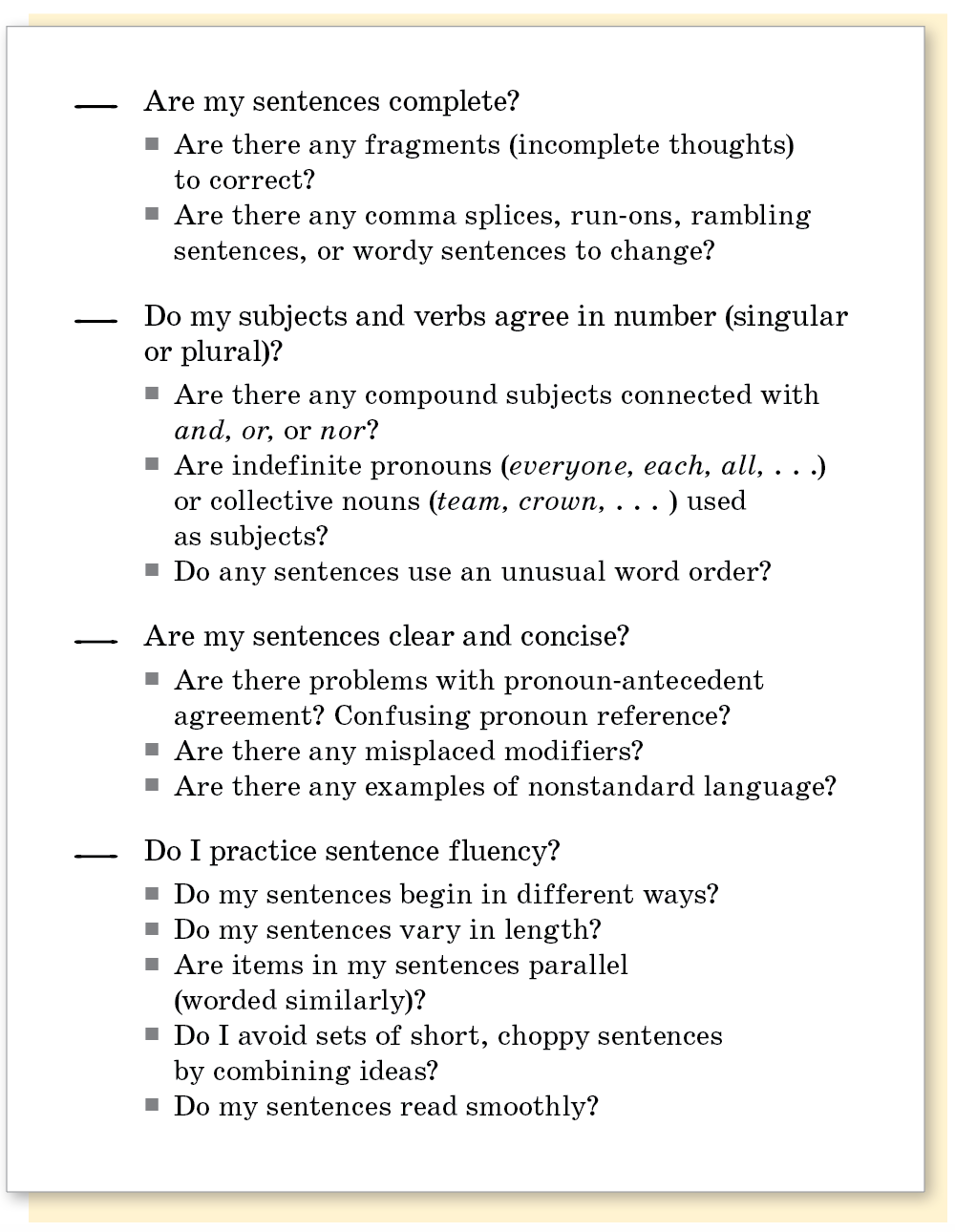WOC 078
Page 78
Learning Writing Skills
Creating Sentences 79
Building Paragraphs 91
Writing Essays 103
Writing Techniques and Terms 115
WOC 079
Page 79
Creating Sentences
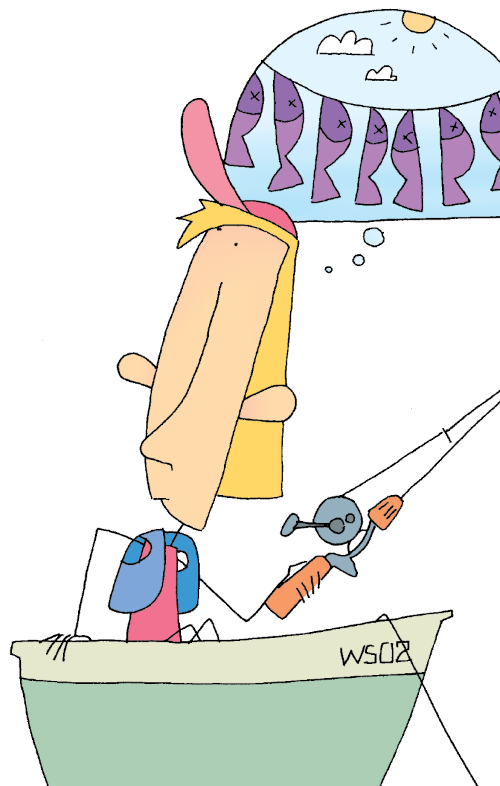
Sometimes the fish are biting. You reel one in only to cast again and catch the next one. Before you know it, you’ve got a string of fish!
Sometimes the sentences come easily. You reel one in only to cast and catch the next. When that happens, writing is a pleasure. The better you get at catching sentence after sentence and stringing them into paragraphs, the more fun you’ll have with writing.
Sentences have two basic parts—the subject (what the sentence is about) and the predicate (the part that says something about the subject). Think of the subject as the head of the fish, and the predicate as the tail that moves the rest.
This chapter teaches you how to catch sentences that really move!
What’s Ahead
WOC 080
Page 80
Understanding Sentence Basics
A sentence is a group of words that expresses a complete thought. To write effective sentences, you first need to understand the basic parts, starting with the subject and the verb.
Parts of a Sentence
Subject: The subject tells who or what is doing something.
Tornadoes stalk the Great Plains.
Verb: The verb (also called the predicate) expresses action or links the subject to another part of the sentence.
Tornadoes stalk the Great Plains.
(action verb)
They are frequent visitors to Tornado Alley.
(linking verb)
Helping/auxiliary verbs: In some sentences, one or more helping or auxiliary verbs complete the main verb.
F5 wind speeds can reach 318 miles per hour.
An average tornado will be as wide as a football field.
Compound Subjects and Verbs: A sentence may include more than one subject and/or more than one verb.
Basements and closets provide some protection.
(two subjects)
Windows shatter and fly like shrapnel.
(two verbs)
Additional Words: Almost all sentences contain additional words that complete the thought.
The U.S. has an average of 1,200 tornadoes per year.
Tornado Alley is shifting East across the Mississippi.

Inverted Order
Tornadoes stalk the Great Plains.
(action verb)
They are frequent visitors to Tornado Alley.
(linking verb)
Helping/auxiliary verbs: In some sentences, one or more helping or auxiliary verbs complete the main verb.
F5 wind speeds can reach 318 miles per hour.
An average tornado will be as wide as a football field.
Compound Subjects and Verbs: A sentence may include more than one subject and/or more than one verb.
Basements and closets provide some protection.
(two subjects)
Windows shatter and fly like shrapnel.
(two verbs)
Additional Words: Almost all sentences contain additional words that complete the thought.
The U.S. has an average of 1,200 tornadoes per year.
Tornado Alley is shifting East across the Mississippi.

Inverted Order
In some sentences, the subject comes after the verb:
There is a tornado in The Wizard of Oz.
(a sentence beginning with there)
Are you afraid of tornadoes?
(a question)
WOC 081
Page 81
Using Different Types of Sentences
Sentences come in all shapes and sizes, from simple to complex. Watch for these four types of sentences.
Simple sentences contain a subject and a verb and express a complete thought.
Sirens blared. Jennie and I went to the basement.
Compound sentences include two or more simple sentences that are joined by a semicolon or a comma and a coordinating conjunction (and, but, or, nor, for, so, yet).
The sky grew green, and we heard a roar like a freight train approaching.
Complex sentences include one independent clause (simple sentence) and one or more dependent clauses (beginning with because, when, while, who, and so on).
While Jennie checked the NOAA radar (dependent clause), I watched out the window (independent clause).
Compound-complex sentences contain two or more independent clauses and one or more dependent clauses.
When the transformer blew, we hid under a table, and Gato joined us there.
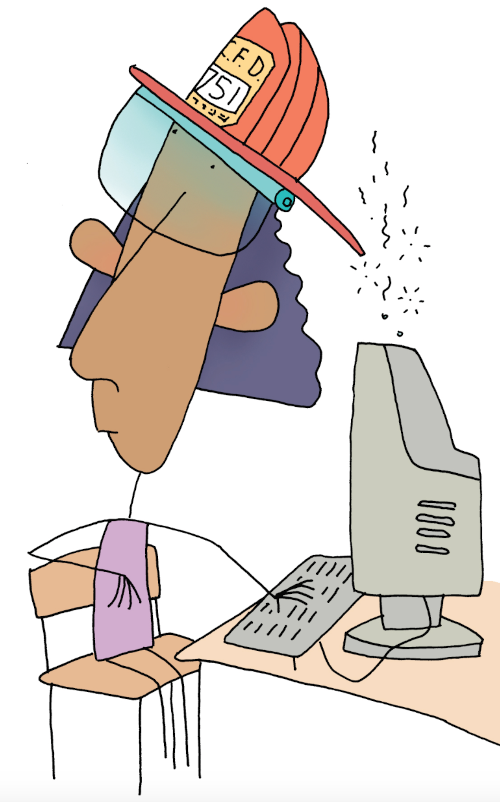
Using Different Kinds of Sentences
Different kinds of sentences do different jobs.
A declarative sentence makes a statement.
First responders scrambled.
An interrogative sentence asks a question.
Do you know how much damage occurred?
An imperative sentence gives a command or makes a request.
Take cover immediately.
An exclamatory sentence communicates strong emotion.
A tornado is coming!
WOC 082
Page 82
Writing Correct Sentences
Complete, correct sentences express ideas clearly. Avoid sentence fragments, comma splices, run-ons, and rambling or wordy sentences.
Sentence Fragment
A sentence fragment is a group of words that is missing a subject or verb (or both). It does not express a complete thought.
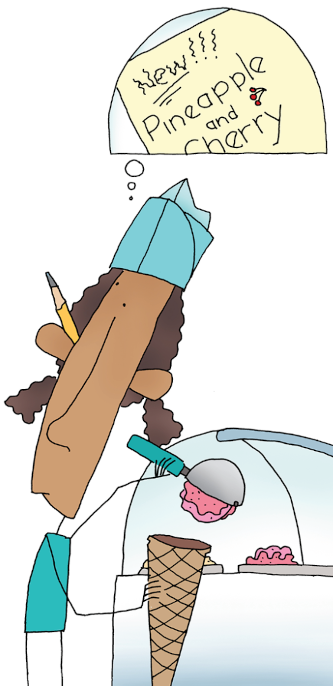
Sentence fragment (no subject)
Is my favorite flavor.
Complete sentence
Rocky road is my favorite flavor.
Sentence fragment (no verb)
Marshmallows and nuts, chewy and crunchy.
Complete sentence
Marshmallows and nuts make the ice cream chewy and crunchy.
Sentence fragment (no subject or verb)
With an ice-cream headache!
Complete sentence
I hope I don’t end up with an ice cream headache!
Comma Splice
A comma splice is an error made when you connect two simple sentences with just a comma.
Comma splice (no conjunction)
I work at an ice cream parlor, every day ends with a scoop in a waffle cone.
Corrected sentences
I work in an ice cream parlor, so every day ends with a scoop in a waffle cone.
WOC 083
Page 83
Run-On Sentence
A run-on sentence occurs when two simple sentences are joined without punctuation or a connecting word.
Run-on sentence
The tent went up in the first half hour we took the next hour to light the campfire.
Corrected sentence
The tent went up in the first half hour, but we took the next hour to light the campfire.
Rambling Sentence
A rambling sentence occurs when you connect too many ideas with the word “and.”
Rambling sentence
We crumpled newspapers and put them on a bed and then gathered dry twigs and put them on next and over them we put on small branches and over those a couple of big logs and hoped that the paper would light the sticks and then the branches and then the logs, but the newspapers burned away leaving just a smoldering pile.
Corrected sentences
We built the fire with crumpled newspapers, dry twigs, small branches, and big logs. The newspapers lit, but the rest failed to catch, leaving us with a smoldering pile.
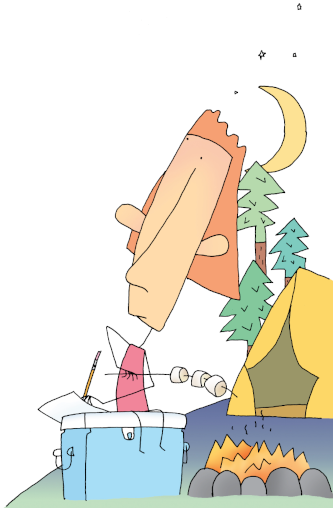
Wordy Sentence
We crumpled newspapers and put them on a bed and then gathered dry twigs and put them on next and over them we put on small branches and over those a couple of big logs and hoped that the paper would light the sticks and then the branches and then the logs, but the newspapers burned away leaving just a smoldering pile.
Corrected sentences
We built the fire with crumpled newspapers, dry twigs, small branches, and big logs. The newspapers lit, but the rest failed to catch, leaving us with a smoldering pile.

Wordy Sentence
A wordy sentence occurs when you repeat words (or their synonyms) unnecessarily. The result is a tedious sentence that wastes readers’ time.
Wordy sentence
I love a campfire, and I love roasting marshmallows on the fire at my camp because a campfire makes the camp a lovely place to camp.
Corrected sentence
I love roasting marshmallows over a campfire.
I love roasting marshmallows over a campfire.
WOC 084
Page 84
Writing Sentences That Agree
Subjects and verbs must agree in number. A singular subject needs a singular verb (John likes pizza), and a plural subject needs a plural verb (We like pizza). Watch for tricky situations.
Compound Subjects
Compound subjects connected by and need a plural verb.
Claire and Luis consider possible writing topics.
With compound subjects connected by or or nor, the verb must agree with the subject that is nearer the verb.
Neither his friends nor Dequan has decided on a topic.
(The singular verb has decided agrees with Dequan.)
Neither Dequan nor his friends have decided on a topic.
(The plural verb have decided agrees with friends.)

Unusual Word Order
Check carefully when the subject is separated from the verb by words or phrases.
Claire, as well as Luis and Dequan, thinks of a topic.
(The singular verb thinks agrees with the subject Claire.)
Check carefully when the subject comes after the verb.
Under consideration are cruises, robins, and Saturn.
(The verb are agrees with cruises, robins, and Saturn.)
First to decide is Luis with the topic of Saturn.
(The singular verb is agrees with Luis.)
Has Dequan decided to write about cruises?
(The singular verb has decided agrees with Dequan.)
WOC 085
Page 85
Indefinite Pronouns
Use a singular verb when the subject is a singular indefinite pronoun (each, either, neither, one, everyone, everybody, everything, someone, somebody, anything, nobody, another).
Each of my friends loves science, technology, engineering, and math (STEM).
Some indefinite pronouns (all, any, most, none, some) can be either singular or plural. Check the noun in the prepositional phrase after the verb.
Most of my friends are on my STEM team.
(The noun friends is plural, so the verb are is plural.)
Most of our experiment is complete.
(The noun experiment is singular, so the verb is is singular.)

Collective Nouns
A collective noun names a group: faculty, committee, team, congress, species, crowd, army, pair. When it refers to the group as a whole, use a singular verb.
The STEM team hopes to invent a new kind of all-purpose cleaner.
(STEM team refers to the whole group, so the verb hopes is singular.)
STEM staff advise each member of the team.
(STEM staff refers to individual advisors, so the verb advise is plural.)
Helpful Hint
You can find more about compound subjects, indefinite pronouns, collective nouns, and subject-verb agreement in the “Proofreader’s Guide.”
WOC 086
Page 86
Writing Clear Sentences
Create sentences that are clear and to the point. The next two pages identify problems that can lead to confusing sentences.
Problems with Pronouns
Avoid sentences in which a pronoun does not agree with its antecedent. An antecedent is the word the pronoun refers to.
Agreement problem
Someone left their skateboard in the locker room.
(The antecedent someone is singular, but their is plural. To avoid gender problems, the easiest fix is to eliminate the second pronoun.)
Corrected sentence
Someone left a skateboard in the locker room.
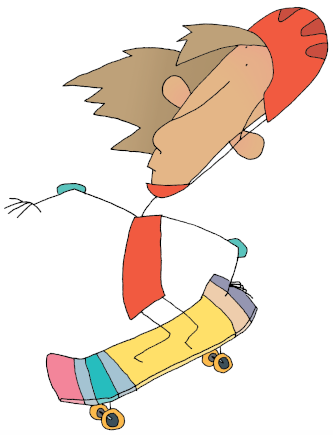
Avoid sentences with a confusing pronoun reference.
Confusing pronoun reference
When I ground my skateboard down the rail, it almost broke in two.
(In the first sentence, the pronoun it might refer to either skateboard or rail. Rewording clarifies the reference.)
Corrected sentence
When I ground down the rail, my skateboard almost broke in two.
Avoid sentences in which a pronoun is used immediately after the subject. The result is usually a double subject.
Double subject
My skateboard it hasn’t failed me yet.
Corrected sentence
My skateboard hasn’t failed me yet.
WOC 087
Page 87
Misplaced Modifiers
Make sure that modifying words and phrases appear as close as possible to the words they modify. Otherwise the sentence can become very confusing.
Dangling modifier
After completing a 180 kickflip, the crowd at the skatepark went wild.
(This sentence seems to say that the crowd completed a 180 kickflip and then cheered.)
Corrected sentence
After completing a 180 kickflip, I heard the crowd at the skatepark go wild.
(Now the phrase After completing a 180 kickflip correctly modifies I heard.)
Nonstandard Language
Avoid sentences that include a double negative.
Double negative
Never let nobody mess with your board before a trick.
Corrected sentence
Never let anybody mess with your board before a trick.
(Nobody is changed to anybody because never is a negative word.)
Do not use hardly, barely, or scarcely with a negative word; the result is a double negative.
Double negative
I don’t hardly know what trick to try next.
Corrected sentence
I don’t know what trick to try next.
(or)
I hardly know what trick to try next.
Avoid sentences that incorrectly use of for have.
Incorrect usage
I would of liked to try a backside 360.
Corrected sentence
I would have liked to try a backside 360.
Never let nobody mess with your board before a trick.
Never let anybody mess with your board before a trick.
(Nobody is changed to anybody because never is a negative word.)
I don’t hardly know what trick to try next.
I don’t know what trick to try next.
(or)
I hardly know what trick to try next.
I would of liked to try a backside 360.
I would have liked to try a backside 360.
WOC 088
Page 88
Combining Sentences
You can combine two or more short, choppy sentences into one longer, more detailed sentence. Sentence combining improves the flow and sophistication of your writing.
Combining with Key Words
You can combine sentences by moving a key word from one sentence to the other.
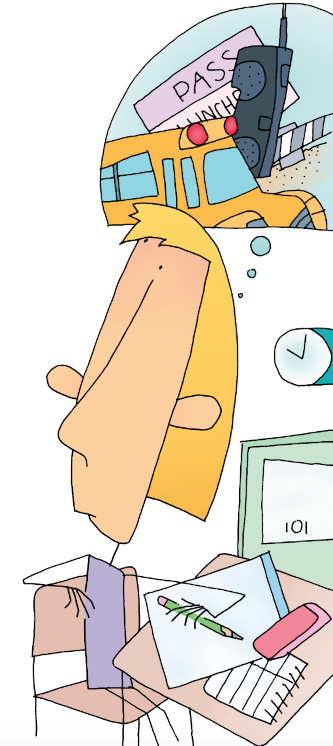
Short sentences
The cat jumped on the couch. The cat was chunky.
Combined sentence using an adjective
The chunky cat jumped on the couch.
Short sentences
The snowboarder sliced down the slope. It was the expert-level slope.
Combined sentence using a compound adjective
The snowboarder sliced down the expert-level slope.
Short sentences
My family is leaving for a vacation in Puerto Rico. We are leaving tomorrow.
Combined sentence using an adverb
My family is leaving tomorrow for a vacation in Puerto Rico.
Combining with a Series of Words or Phrases
You can combine ideas from shorter sentences using a series of words or phrases. Each item in the series should be parallel, or stated in the same way.
Short sentences
The bus is loud. The bus is chaotic. It is smelly.
Combined sentence using a series of words
The bus is loud, chaotic, and smelly.
WOC 089
Page 89
Combining with Phrases
You can combine shorter sentences into one sentence using appositive, infinitive, and participial phrase.
Short sentences
Yesterday, Cortney served meals at Hope House. Hope House is a local homeless shelter.
Combined sentence using an appositive
Yesterday, Cortney served meals at Hope House, a local homeless shelter.
Short sentences
Cortney was studying for a science test. She checked her notes, reread two chapters, and answered review questions.
Combined sentence using an infinitive phrase
To study for a science test, Cortney checked her notes, reread two chapters, and answered review questions.
Short sentences
Andre carefully examined the microorganisms. He adjusted the microscope.
Combined sentence using a participial phrase
Adjusting the microscope, Andre carefully examined the microorganisms.
Combining with Compound Subjects and Verbs
Ideas from shorter sentences can be combined using compound subjects and compound verbs (predicates).
Short sentences
Chang plays the saxophone. Nelle plays the saxophone, too.
Combined sentence using a compound subject
Chang and Nelle play the saxophone.
Short sentences
Mandy baked cookies. She sold them at the festival.
Combined sentence using a compound verb:
Mandy baked cookies and sold them at the festival.
WOC 090
Page 90
Sentence
Use this sentences checklist as a guide when you revise and edit your writing for sentence correctness and sentence fluency.
Sentence Checklist
